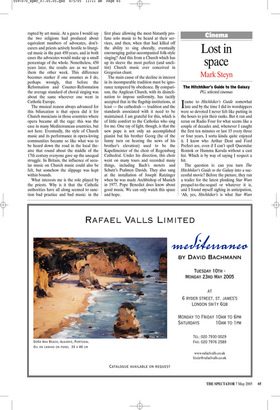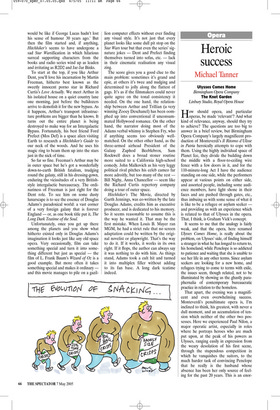Lost in space
Mark Steyn
The Hitchhiker’s Guide to the Galaxy PG, selected cinemas
Icame to Hitchhiker’s Guide somewhat late and by the time I did its worshippers were so devoted I never felt like putting in the hours to join their ranks. But it ran and reran on Radio Four for what seems like a couple of decades and, whenever I caught the first ten minutes or last 15 every three or four years, I sorta kinda quite enjoyed it. I know who Arthur Dent and Ford Prefect are, even if I can’t spell Questular Rontok or Humma Kavula without a cast list. Which is by way of saying I respect a hit.
The question is: can you turn The Hitchhiker’s Guide to the Galaxy into a successful movie? Before the picture, they ran a trailer for the latest plonking Star Wars prequel-to-the-sequel or whatever it is, and I found myself sighing in anticipation, ‘Ah, yes, Hitchhiker’s is what Star Wars would be like if George Lucas hadn’t lost his sense of humour 30 years ago.’ But then the film started and, if anything, Hitchhiker’s seems to have undergone a sad Star Warsification in which hilarious surreal supporting characters from the books and radio series wind up as leaden and irritating as R2D2 and Jar-Jar Binks.
To start at the top, if you like Arthur Dent, you’ll love his incarnation by Martin Freeman, hitherto best known as the sweetly innocent porno star in Richard Curtis’s Love Actually. We meet Arthur in his isolated house on a quiet country lane one morning, just before the bulldozers arrive to demolish it for the new bypass. As it happens, Arthur’s transport infrastructure problems are bigger than he knows. It turns out the entire planet is being destroyed to make way for an Intergalactic Bypass. Fortunately, his best friend Ford Prefect (Mos Def) is a space alien visiting Earth to research a Hitchhiker’s Guide to our neck of the woods. And he uses his magic ring to beam them up into the stars just in the nick of time.
So far so fine. Freeman’s Arthur may be in outer space but he’s got a wonderfully down-to-earth British fatalism, trudging round the galaxy, still in his dressing-gown, enduring the vicissitudes of a very Britishstyle intergalactic bureaucracy. The ordinariness of Freeman is just right for the Dent role. To see him on some dusty lunarscape is to see the essence of Douglas Adams’s paradoxical world: a vast corner of a very foreign galaxy that is forever England — or, as one book title put it, The Long Dark Teatime of the Soul.
Unfortunately, once you get up there among the planets and you show what hitherto existed only in Douglas Adams’s imagination it looks just like any old space opera. Very occasionally, film can take something special and turn it into something different but just as special — the film of L. Frank Baum’s Wizard of Oz is a good example. But more often it takes something special and makes it ordinary and this movie manages to pile on a gazil lion computer effects without ever finding any visual style. It’s not just that every planet looks like some dull pit stop on the Star Wars tour but that even the series’ signature jokes — Dent and Prefect finding themselves turned into sofas, etc. — lack in their cinematic realisation any visual zing.
The score gives you a good clue to the main problem: sometimes it’s grand and epic, at others it’s twee and nudging and determined to jolly along the flattest of gags. It’s as if the filmmakers could never quite agree on the tonal consistency it needed. On the one hand, the relationship between Arthur and Trillian (a very winning Zooey Deschanel) has been oomphed up into conventional if unconsummated Hollywood romance. On the other hand, the narrator doing most of the Adams verbal whimsy is Stephen Fry, who if anything seems too obviously wellmatched. On the other other hand, as the three-armed airhead President of the Galaxy Zaphod Beeblebrox, Sam Rockwell does a broad stoner routine more suited to a California high-school comedy. John Malkovich as his very leggy political rival pitches his celeb cameo far more adroitly, but too many of the rest Bill Nighy, Anna Chancellor — seem like the Richard Curtis repertory company doing a tour of outer space.
Hitchhiker’s The Movie, directed by Garth Jennings, was co-written by the late Douglas Adams, credits him as executive producer, and is dedicated to his memory. So it seems reasonable to assume this is the way he wanted it. That may be the first mistake. When Louis B. Mayer ran MGM, he had a strict rule that no screen adaptation could be written by the original novelist or playwright. That’s the way to do it. If it works, it works in its own right. If it flops, the author can always say it was nothing to do with him. As things stand, Adams took a cult hit and turned it into multiplex filler without adding to its fan base. A long dark teatime indeed.




























































 Previous page
Previous page